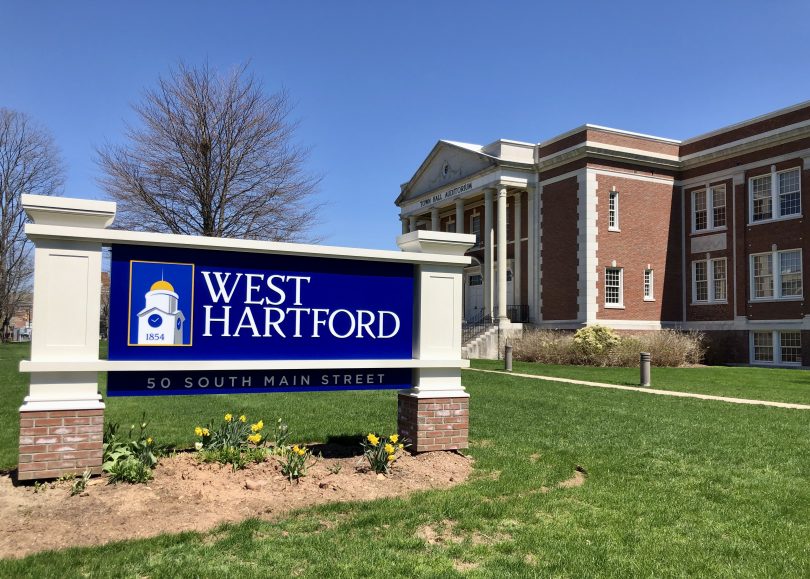The West Hartford Town Council trimmed $812,000 from the proposed 2022-2023 General Fund budget, and opted to phase in the revaluation in order to mitigate the impact to property owners.
By Ronni Newton
The West Hartford Town Council approved a $317,082,151 budget for the 2022-2023 fiscal year with a mill rate of 40.68 mills with a vote of 6-3 along party lines Tuesday night. The Council also opted to phase in the most recent revaluation, applying 75% of the increased value of real property in the upcoming fiscal year.
After two public hearings and four workshops by Town Council committees that reviewed each department’s budget, the final spending plan was reduced by $812,020 from the original $317,894,171 proposed by Acting Town Manager Rick Ledwith on March 8. The mill rate has been reduced by 1.74 mills, or 4.1%, from the current rate of 42.42 mills.
The overall spending plan is a 2.8% increase over the fiscal year 2021-2022 budget of $308,442,028. The Board of Education made some minor adjustments to the original proposal made by Superintendent Tom Moore, and on April 5 approved a $181,087,018 budget with a 3.21% spending increase that has been incorporated as is into the town’s budget. Spending for town services will increase by 1.6% ($1,873,259) to $119,115,672, which is roughly $300,000 less than the original proposal, and capital financing will increase by 7.26% ($1,135,901), about $375,000 less than the March 8 budget proposal.
Reductions in the town services portion of the budget were primarily realized through not funding all new positions, or funding some of them halfway through the year. American Rescue Plan Act (ARPA) funds will be used for the first six months of salary and benefit costs for an assistant director of Social Services, and ARPA funds will also be used for a vehicular crash study. A contingency for an option of direct hauling of recycled materials was eliminated from the Public Works budget, saving $40,000.
A remaining balance in the town’s Capital and Non-Recurring Expenditure (CNRE) fund has been applied to reduce the capital financing costs, Ledwith said. Although one of the major projects included in the town’s Capital Improvement Program – $3 million for new tennis courts at both Conard and Hall High Schools – will now be funded by a state grant, eliminating the need to issue bonds for that project, the financial impact of that is spread out over multiple years.
West Hartford’s current mill rate is 42.42 mills, and while the adopted mill rate of 40.68 mills for the upcoming fiscal year is higher than the rate initially proposed on March 8 (39.65 mills), the tax burden for many taxpayers will be lessened due to a phasing in of the most recent revaluation, adjusting the Grand List to incorporate just 75% of the new assessed values for real property that increased in value. The plan is for the remaining 25% of the revaluation to be incorporated in the next fiscal year.
West Hartford was on schedule for its revaluation in 2021, a process required to take place every five years by state statute. Due to trends in the real estate market, pockets of town – primarily in the area east of King Philip Drive and North of Albany Avenue, as well as Elmwood – saw assessed value increase as much as 20% to 30%, or even more. The PDF below is a map of the revaluation changes, with the areas in pink, royal blue, and red indicating the highest percentage increases, largely concentrated in the town’s less-wealthy neighborhoods.
While the Grand List increased by 12.2%, and commercial property overall increased in value by about 7%, several major parcels saw their values drop significantly. Blue Back Square, which recently sold, dropped by about 50% and Westfarms’ assessment dropped by about 20%.
The most recent Grand List indicated an unprecedented overall increase in vehicle values of 24.9%.
While it is virtually impossible to profile an “average” property owner this year because of the impact of the revaluation in different parts of town, assuming an average assessment increase of roughly 13.58%, however, Ledwith said a taxpayer who paid the average real and personal property taxes of $9,652 in FY2022 could expect to see that increase by about 8.92% for the upcoming fiscal year. An “average” motor vehicle is now assessed at $13,570, an increase of 25.43%, which increases the motor vehicle tax by 20.27% at the new mill rate, and an “average” overall tax increase of 9.91% for a homeowner with two cars.
The governor has proposed a cap on the automobile mill rate which would provide savings for West Hartford taxpayers, with the state reimbursing the town for the lost revenue, but the legislature has not yet approved the state budget so the town has passed its budget with a uniform mill rate.
Council members, before a roll call vote on each of the budget ordinances, expressed their thanks to Ledwith, the financial services staff – particularly CFO Peter Privitera and Financial Operations Manager Lisa Newton – to Assessor Joseph Dakers, and to the directors of all of the town’s departments who have spent months working on the budget.
Deputy Mayor Liam Sweeney, a Democrat who chairs the Council’s Finance and Administration Committee, said he especially appreciated the special meeting and workshop held to discuss the impact of revaluation.
“To me this budget is about protecting today’s taxpayers,” he said, while also meeting the future needs for residents and businesses. Because there wasn’t a uniform impact of revaluation there was a greater challenge, but Sweeney said the phase-in “is a really good way to help people who are hurting right now” while also looking responsibly toward the future, keeping a focus on education and community development.
The budget also properly funds public safety, he said, providing “what we know are their priorities.” The Council listened to the community, to staff, and to businesses, he said.
Republican Mary Fay, the minority leader and also a member of the Finance and Administration Committee, said the Council “did work very hard and we did come to a pretty good place.” But she said that because 80% of the budget is salary and benefits that are subject to negotiated agreements, “it’s frustrating to throw up our hands every year.” She also noted concern for the taxpayers who have “gotten sticker shock from the revaluations.”
Fay said she thinks we could get to a zero tax increase, which would involve cutting $12 million, suggesting not paying workers’ compensation at a rate of 100%, and increasing revenue by not allowing tax abatements.
In July 2020, the Town Council approved its first tax abatement, a 10-year plan for the One Park Road development, currently under construction at the corner of Park Road and Prospect Avenue, in order to allow the project to finally go forward eight years after it was first proposed. The parcel, owned by the Sisters of Saint Joseph of Chambery, had not generated taxes in its prior 140-year history.
While the Council can’t address line items in the Board of Education budget, only the total allocation, Fay noted that the town has 200 children enrolled in the Open Choice program, with reimbursement by the state of $4,000 per student, only a fraction of the roughly $20,000 average per pupil expenditure. “I think everyone should have the same education, but the question is who pays for that,” she said regarding what she later referred to as an unfunded mandate.
Fay also expressed concern about phasing in the revaluation, and said she hoped there could be another revaluation if the real estate market changes drastically.
Democrat Ben Wenograd, who refuted Fay’s suggestions (he said workers’ compensation is subject to collective bargaining, the tax abatement was a special circumstance for a non-revenue-producing property and it allowed the nuns to retain their home, and the marginal cost of adding students is not as great as $16,000 per student), expressed his support for the budget and spending changes as “reasonable and prudent” and praised the incorporation of sustainability in the Council’s decision making. He also noted that this is the first year in a very long time that pensions are not a driver of the budget, since the town approved the sale of Pension Obligation Bonds last year.
Wenograd noted that the problem is that while the property tax distribution is regressive and unfair, “however, this budget must conform to current laws,” and the phase-in is an effort to mitigate the tax increase.
More housing options are needed, Wenograd said, both market rate and affordable, as are new revenue sources. The town received about $20,000 in rebates from the state for the sale of nip bottles, and forthcoming cannabis tax revenues will be steps in the right direction, he said.
Republican Mark Zydanowicz expressed concern about phasing in the revaluation and the potentially “devastating impact” that adding in the additional 25% of increased value could have in next year’s tax cycle. He said that while it’s hard, “let’s rip off the band-aid. I say we go full in.”
Democrat Carol Blanks said West Hartford “continues to be the best place to live, according to Niche.com,” an accolade earned by the town for the past five years. “We are painfully aware that we are far from perfection, and we cannot sit on our laurels because we have plenty of work to do,” she added, particularly with respect to equity, diversity, inclusion, climate change, stormwater drainage, and affordable housing.
Blanks, who lives in Elmwood where the revaluation greatly impacted residents, said she completely identifies with homeowners who have experienced an unexpected increase in home values.
“This is a good budget … it’s not perfect but it’s a work in progress,” she added.
Republican Alberto Cortes said that while the budget is the best option of those presented, “My question is, is this the best option for our town?” He said the way the mill rate is determined is not equitable, which is something that our legislators need to hear about, and he also struggled with the phase-in option.
With $200 million of the budget tied up in salaries, “Where do we find this money?” he said.
“I believe we made the best possible choice for the residents to implement the phase in,” said Democrat Adrienne Billings-Smith, who lives in the north end of town in an area also greatly impacted by revaluation.
“I look at it as, ‘okay this is the surprise,’ so my family has a moment to prepare for what happens next year,” she said of the phase in.
“I support this budget, I support everyone in this building and what they’re trying to do,” said Billings-Smith, thanking the department directors for prioritizing their needs.
Democrat Leon Davidoff said this is his 15th year working on the West Hartford budget – and he previously spent three years serving in Newington. “At the end of the day I think that we’ve realized we’ve done the best that we can do and we compromised and we put in the hard work,” he said, creating a budget that sets priorities and will serve as a road map for what we want to do with our town.
The budget also tells the town’s story to the agencies that consistently provide West Hartford with the highest bond rating, showing that the town takes fiscal management very seriously, he said.
Davidoff praised the town schools, the town services, and also noted that if not for Mayor Shari Cantor’s persistence in pursuing the sale of Pension Obligation Bonds last year, this budget would have had millions more in spending. The town did have significant Grand List growth, he said, which combats tax increases, and is not allowing development to take place “willy nilly” but rather with strict standards “because we want to enhance our community, not diminish it.”
Everyone’s property is unique, but Davidoff said he knew his house was going to increase in value when he saw neighbors selling their homes for $70,000 to $80,000 over asking price. “But I do know that what I get for the property taxes I pay, that it’s something I’m willing to do.”
Davidoff said he understands what revaluation means, and respectfully disagreed with his colleagues’ concern about the impact of the 75%-25% phase-in plan, adding “I believe that West Hartford’s brightest days are ahead.”
“Our staff is highly professional and they deliver the highest quality work,” said Cantor, expressing her thanks to town leadership and employees who have recently faced tremendous challenges.
“I felt this was a way to be fair and balanced,” Cantor said regarding the 75%-25% phasing in of the Grand List growth. While there haven’t been many years without an increase, she said, “Some years we have a tax increase and some years we don’t.” When there is an increase, she said, it’s on average 1.5% below the Consumer Price Index, which is intentional.
“We’ve always had a high mill rate,” said Cantor. When she gradated from high school, she said West Hartford’s mill rate was in the 70s and the town didn’t have the level of diversity or the developed town centers.
Regarding the current budget, Cantor said, “I think we did a good job under challenging circumstances.”
Priorities going forward include expanding diversity, adding housing stock by putting more supply on the market, adding to efficiencies, and promoting economic development and growing the Grand List, said Cantor. Also needed are changes to the tax structure including paying for trash as a utility and looking at how the state does revaluation.
“We will continue to do the hard work and support our directors and meet those challenges,” Cantor said, to continue to keep West Hartford a top-rated community.
Like what you see here? Click here to subscribe to We-Ha’s newsletter so you’ll always be in the know about what’s happening in West Hartford! Click the blue button below to become a supporter of We-Ha.com and our efforts to continue producing quality journalism.
 Loading...
Loading...









Why not adjust the mill rate to minimize the increase in property values? Where will this added money go? Certainly, not the roads.
I love hearing all the people complain but yet have stayed. I’m so glad that we moved since our kids have gotten a better education, we pay significantly less taxes and are locked into a maximum of a 3% increase in property tax as dictated by our state’s constitution. The taxes on our little house in West Hartford are now over $9,000 per year and our house now is 60% larger and we finally have to pay a bit over $3,000. Our kids have gotten 5’s on all their AP exams and will graduate college in 2.5 – 3.5 years. The town told us that if we didn’t like how they ran things, we should leave….thank you for the advice!!